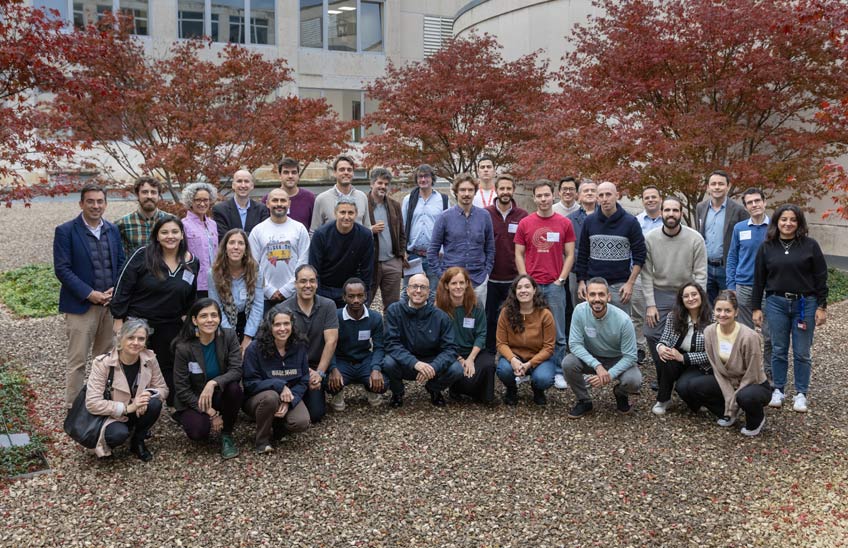BOHEMIA clinical essay supports use of ivermectin to control malaria
The study conducted in Kenya and coordinated by Carlos Chaccour, researcher at ISGlobal and the University of Navarra, sample a 26% reduction in new infections among children aged 5 to 15 years.

FotoManuel Castells<br>/Carlos Chaccour, investigador de ISGlobal y de la Universidad de Navarra
24 | 07 | 2025
Administering ivermectin to the entire population significantly reduces malaria transmission, opening a new avenue of hope in the fight against this disease. The BOHEMIA clinicalessay , the largest study to date on the use of ivermectin against malaria, showed that its administration, combined with the use of mosquito nets, reduced new infections by 26%.
These results provide strong evidence for the potential of ivermectin as a complementary tool in malaria control. The project was coordinated by the Barcelona Institute for Global Health (ISGlobal), a center supported by the "la Caixa" Foundation, in partnership with the research center for International Health Research in Manhiça (CISM) and the KEMRI-Wellcome Trust Research Programme. The finding has been published in The New England Journal of Medicine.
Carlos Chaccour, researcher at the Navarra Center for International Development (NCID) of the University of Navarra, has been co-principal investigator of BOHEMIA and researcher at ISGlobal at the time of the study and he values that the results "are very encouraging". He also points out that "ivermectin has shown great potential to reduce malaria transmission and could complement existing control measures. With further research, it could become an effective tool to control and even contribute to the elimination of malaria.
Malaria poses a major global health challenge , with 263 million cases and 597,000 deaths reported in 2023. Current vector control strategies, such as long-lasting insecticide-treated bed nets and indoor residual spraying, are losing effectiveness due to increasing mosquito resistance to insecticides, as well as changes in their behavior: they now tend to bite outdoors and during dawn or dusk, times when people are not protected by these measures. All this highlights the urgent need to find innovative solutions to curb the transmission of the disease.
Ivermectin against malaria: an innovative strategy
Ivermectin, a drug traditionally used to treat neglected tropical diseases such as onchocerciasis (river blindness) and lymphatic filariasis (elephantiasis), has been shown to reduce malaria transmission by killing mosquitoes that feed on treated individuals. In the face of increasing resistance to conventional insecticides, ivermectin offers a promising alternative approach , especially in regions where the usual methods are no longer effective.
The BOHEMIAproject , funded by Unitaid, conducted two mass drug administration trials in high malaria burden areas: Kwale County (Kenya) and Mopeia District (Mozambique). Both trials evaluated the safety and efficacy of a single monthly dose of ivermectin (400 mcg/kg) administered for three consecutive months at the start of the rainy season. In Kenya, the intervention focused on children aged 5-15 years, while in Mozambique it targeted children under five years of age.
Promising results in Kenya
In Kwale County, children who received ivermectin had a 26% reduction in malaria incidence over those who received albendazole, the control drug used in the study. The essay included more than 20,000 participants and more than 56,000 treatments were administered, demonstrating that ivermectin can significantly reduce infection fees , especially among those living farther away from cluster edges or in areas where drug distribution was more effective. In addition, the safety profile of ivermectin was favorable, with no serious drug-related adverse effects and only mild and transient side effects, already known from its use in previous campaigns against neglected diseases.
"The data obtained are in line with World Health Organization (WHO) criteria for new vector control tools," says Joseph Mwangangi of the KEMRI-Wellcome Trust Research Programme. "The findings suggest that mass administration of ivermectin could be a valuable complementary strategy, especially in areas where mosquito resistance to insecticides is of increasing concern," explains Marta Maia, senior entomologist at BOHEMIA at the University of Oxford.
Lessons from Mozambique
In contrast, the implementation of the essay in the rural district of Mopeia, Mozambique, was severely affected by Cyclone Gombe (2022) and a subsequent cholera outbreak, which significantly disrupted operations. "One of the most important lessons we took away from Mopeia was the need for strong community engagement," says Francisco Saúte, CISM director . "Building trust with local communities and working in close partnership with the Ministry of Health, the National Malaria Control Program and local authorities was core topic to achieve acceptance of mass administration with ivermectin."
Beyond malaria
In addition to reducing malaria transmission, mass ivermectin administration offers important co-benefits. The BOHEMIA team observed a B in the prevalence of skin conditions such as scabies and lice in Mozambique, and communities in Kenya reported a clear reduction in bed bugs. These additional effects are especially valuable when ivermectin is integrated into existing distribution systems, maximizing its public health impact.
Paving the way for new prevention strategies
This study is part of a larger global effort to evaluate the potential of ivermectin in malaria control. The results were reviewed by the WHO Vector Control group advisor , who concluded that the study had demonstrated impact and recommended further research. The findings were also shared with national health authorities to evaluate their possible inclusion in malaria control programs.
"This research has the potential to transform the future of malaria prevention, especially in endemic regions where current tools are losing effectiveness," concludes Regina Rabinovich, principal investigator of BOHEMIA and director of ISGlobal's Malaria Elimination Initiative. "Thanks to its innovative mechanism of action and a widely proven safety profile , ivermectin can become a powerful complementary option that leverages a safe and well-known drug to reinforce existing control strategies."
reference letter
- Chaccour, C., Maia, M., Kariuki, M., et al. Ivermectin to control malaria- The BOHEMIA cluster randomized trial. New England Journal of Medicine. July 2025. DOI: 10.1056/NEJMoa2411262.




